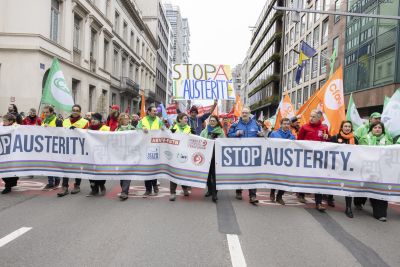The economic forecast published today by the European Commission shows the need for Europe to start supporting investment and fair pay.
The Spring 2024 Economic Forecast predicts economic growth will be “slow” because “investment growth appears to be softening” and is “expected to pick up only gradually”. In particular, it highlights investment in housing and manufacturing as particular concerns.
The situation could be made worse in the coming years as the EU’s Recovery and Resilience Facility (RRF) ends in 2025 and new fiscal rules risk placing strict limits on public investment by member states when they take effect in 2027.
That is why the ETUC is calling for the EU to establish a permanent investment instrument to replace the RFF and for member states to meet the rules by raising taxes rather than cutting investment. The ETUC has also called for the European Central Bank to lower interest rates.
Good news
By contrast, the good news in the forecast is a result of public investment and some wage growth.
It says investment in non-residential construction has been boosted by public investment through the RRF.
It also says that the growth that has been achieved has been “largely driven by a steady expansion of private consumption, as continued real wage and employment growth sustain an increase in real disposable incomes.”
This shows why Europe needs to clearly back fair pay, especially given that the forecast states that real wages will still not have returned to 2021 levels in all member states by next year.
ETUC General Secretary Esther Lynch said:
“Today’s economic forecast is yet more proof that Europe urgently needs economic policies which support investment and fair pay rather than more austerity.
“The European Commission says that economic growth will be ‘slow’ because of a lack of private investment and the few positives are as a result of public investment through the Recovery and Resilience Facility and some wage rises.
“Yet we still have the European Central Bank disincentivising private investment with high interest rates, new fiscal rules which will risk putting a straitjacket on public investment and some conservatives claiming falsely that wages are to blame for our economic problems.
“We need the EU’s economic policies to respond to the facts in front of us by supporting the public and private investment that we need to move to a green and digital economy in a way that creates quality jobs and raises living standards.”

